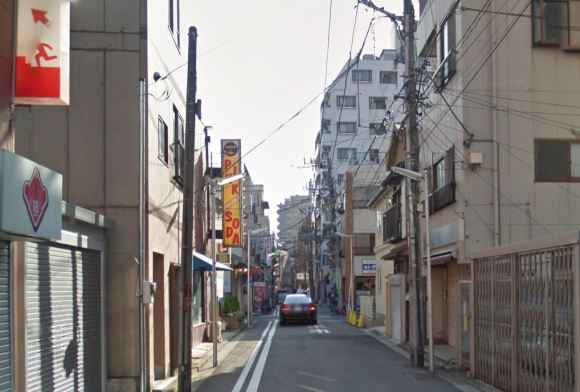
A gaping loophole in Japan’s already grossly outdated law means any same-sex oriented part of the sex-industry can technically operate with total impunity.
■ New Half Health
For about four years, a type of so-called “new half health” business had been operating out of a residential condo in Yokohama City. In Japanese, “new half” is a term used for transgender individuals, with the “health” part a euphemistic term for sexual massages. As such, male employees dressed in women’s clothes could be seen going in and out at all times of the day along with a steady stream of clientele.
The service had no sign set up outside the room or building but posted on new half health websites with contact information so that customers could make reservations and have the apartment building’s autolock door opened for them upon their arrival. Although discrete in theory, the other residents gradually caught on to the scheme when they witnessed customers in various states of undress in common areas of the building and entering elevators smelling strongly of perfume.
Convinced they were dealing with some type of prostitution service, the residents’ union for the building approached the police to have it shut down. However, no raid was conducted on the new half health parlor because sex for money involving only men is not covered by Japan’s law regulating the sex industry. Whether they objected not, what was going on in the residents’ building was, technically, legal.
■ Fueiho
Regular readers may recall fueiho, that backwards law which prevented and still heavily regulates dancing at nightclubs in Japan. Formally known as the Act on Control and Improvement of Amusement and Entertainment Business, it covers all forms of sexual and potentially sexual businesses like hostess clubs, maid cafes, and regular bars.
Interestingly enough, among all the brutally intricate peculiarities regarding the lighting of dance floors (10 lux or more) and volume of music, it also explicitly defines sex as only the heterosexual variety. This means that a man-on-man or woman-on-woman sex act simply doesn’t exist in the eyes of fueiho and therefore cannot be touched by it.
We won’t even get into the technicalities of how people may identify as either a man or a woman at this point. At the level of awareness and sensitivity Japan’s lawmakers currently have with regards to LGBT culture and issues, you’d be better off trying to explain what spacetime is to them.
■ Reform is needed
Despite the law being unable to help, the residents’ association was still ultimately able to push the new half health parlor out of their building for violating the contract with their landlord, which restricts commercial business from operating in their condo. No formal charges were pressed, however, since the new half health operators and staff appeared to be getting ready to move out of their own accord.
But the residents association isn’t finished. Concerned that this and other businesses are operating inside other residential areas, the association wants to give police the authority to shut such operators down by making fueiho much more more all-encompassing.
It’s an important goal since prostitution in any form brings the threat of all kinds of human rights violations and shouldn’t go unchecked. However, in terms of LGBT rights, this could be a dangerously wrong foot to get off on.
If we’re going to rewrite laws to include transgender and people with non-hetero-exclusive sexuality, it would be unbalanced to address only the criminal ones. Equality ought to be all encompassing, so if same-sex crimes are to be recognized by law, then it only stands to reason that same-sex rights such as legal marriages should also be.
No?
Okay, so you see “space” is traditionally thought to be bound by three dimensions in which all matter exists. However, on the subatomic level flaws in this structure can be observed…
Source: Kanaloco via Yahoo! Japan News, Naver Matome (Japanese)
Top Image: Google Maps

 Is it safe to dance yet? Uncertainty continues to reign supreme in Japan’s club scene
Is it safe to dance yet? Uncertainty continues to reign supreme in Japan’s club scene Japan awards foster parent status to same-sex couple for first time
Japan awards foster parent status to same-sex couple for first time Starbucks Japan unveils new sakura cherry blossom collection for hanami season 2026
Starbucks Japan unveils new sakura cherry blossom collection for hanami season 2026 Is Tokyo Station’s startlingly expensive wagyu bento boxed lunch worth its high price?[Taste test]
Is Tokyo Station’s startlingly expensive wagyu bento boxed lunch worth its high price?[Taste test] One Piece creator has hidden secret of anime treasure’s identity in chest at bottom of real-world ocean
One Piece creator has hidden secret of anime treasure’s identity in chest at bottom of real-world ocean Sakuramochi festival sweetens things up at Tokyo’s Seibu Ikebukuro this season
Sakuramochi festival sweetens things up at Tokyo’s Seibu Ikebukuro this season Japan Extreme Budget Travel! A trip from Tokyo to Izumo for just 30,000 yen [Part 2]
Japan Extreme Budget Travel! A trip from Tokyo to Izumo for just 30,000 yen [Part 2] Japan’s cherry blossom season predicted to start earlier than we’d thought, especially in Tokyo
Japan’s cherry blossom season predicted to start earlier than we’d thought, especially in Tokyo Korean Pokémon baked goods are so popular you can’t find them anywhere, but why?
Korean Pokémon baked goods are so popular you can’t find them anywhere, but why? Sakura Festival in Chiyoda mixes illuminations, boats, music, and Rilakkuma in the heart of Tokyo
Sakura Festival in Chiyoda mixes illuminations, boats, music, and Rilakkuma in the heart of Tokyo We take a cat yoga class at a Japanese rescue cat cafe
We take a cat yoga class at a Japanese rescue cat cafe The results are in! One Piece World Top 100 characters chosen in global poll
The results are in! One Piece World Top 100 characters chosen in global poll Starbucks Japan releases first-ever Hinamatsuri Girls’ Day Frappuccino
Starbucks Japan releases first-ever Hinamatsuri Girls’ Day Frappuccino Japanese restaurant chain serves Dragon Ball donuts and Senzu Beans this spring
Japanese restaurant chain serves Dragon Ball donuts and Senzu Beans this spring Japan Extreme Budget Travel! A trip from Tokyo to Izumo for just 30,000 yen [Part 1]
Japan Extreme Budget Travel! A trip from Tokyo to Izumo for just 30,000 yen [Part 1] Japan’s craziest burger chain takes menchi katsu to new extreme levels
Japan’s craziest burger chain takes menchi katsu to new extreme levels Japanese drugstore sells onigiri at pre-stupid era prices, but how do they compare to 7-Eleven?
Japanese drugstore sells onigiri at pre-stupid era prices, but how do they compare to 7-Eleven? Viral Japanese cheesecake from Osaka has a lesser known rival called Aunt Wanda
Viral Japanese cheesecake from Osaka has a lesser known rival called Aunt Wanda Lawson adds doughnuts to its convenience store sweets range, but are they good enough to go viral?
Lawson adds doughnuts to its convenience store sweets range, but are they good enough to go viral? Japan’s newest Shinkansen has no seats…or passengers [Video]
Japan’s newest Shinkansen has no seats…or passengers [Video] Starbucks Japan releases new sakura goods and drinkware for cherry blossom season 2026
Starbucks Japan releases new sakura goods and drinkware for cherry blossom season 2026 Foreigners accounting for over 80 percent of off-course skiers needing rescue in Japan’s Hokkaido
Foreigners accounting for over 80 percent of off-course skiers needing rescue in Japan’s Hokkaido Super-salty pizza sends six kids to the hospital in Japan, linguistics blamed
Super-salty pizza sends six kids to the hospital in Japan, linguistics blamed Starbucks Japan unveils new sakura Frappuccino for cherry blossom season 2026
Starbucks Japan unveils new sakura Frappuccino for cherry blossom season 2026 Foreign tourists in Japan will get free Shinkansen tickets to promote regional tourism
Foreign tourists in Japan will get free Shinkansen tickets to promote regional tourism The 10 most annoying things foreign tourists do on Japanese trains, according to locals
The 10 most annoying things foreign tourists do on Japanese trains, according to locals Take a trip to Japan’s Dododo Land, the most irritating place on Earth
Take a trip to Japan’s Dododo Land, the most irritating place on Earth Naruto and Converse team up for new line of shinobi sneakers[Photos]
Naruto and Converse team up for new line of shinobi sneakers[Photos] Survey asks foreign tourists what bothered them in Japan, more than half gave same answer
Survey asks foreign tourists what bothered them in Japan, more than half gave same answer Japan’s human washing machines will go on sale to general public, demos to be held in Tokyo
Japan’s human washing machines will go on sale to general public, demos to be held in Tokyo Starbucks Japan releases new drinkware and goods for Valentine’s Day
Starbucks Japan releases new drinkware and goods for Valentine’s Day We deeply regret going into this tunnel on our walk in the mountains of Japan
We deeply regret going into this tunnel on our walk in the mountains of Japan Studio Ghibli releases Kodama forest spirits from Princess Mononoke to light up your home
Studio Ghibli releases Kodama forest spirits from Princess Mononoke to light up your home Major Japanese hotel chain says reservations via overseas booking sites may not be valid
Major Japanese hotel chain says reservations via overseas booking sites may not be valid Put sesame oil in your coffee? Japanese maker says it’s the best way to start your day【Taste test】
Put sesame oil in your coffee? Japanese maker says it’s the best way to start your day【Taste test】 No more using real katana for tourism activities, Japan’s National Police Agency says
No more using real katana for tourism activities, Japan’s National Police Agency says